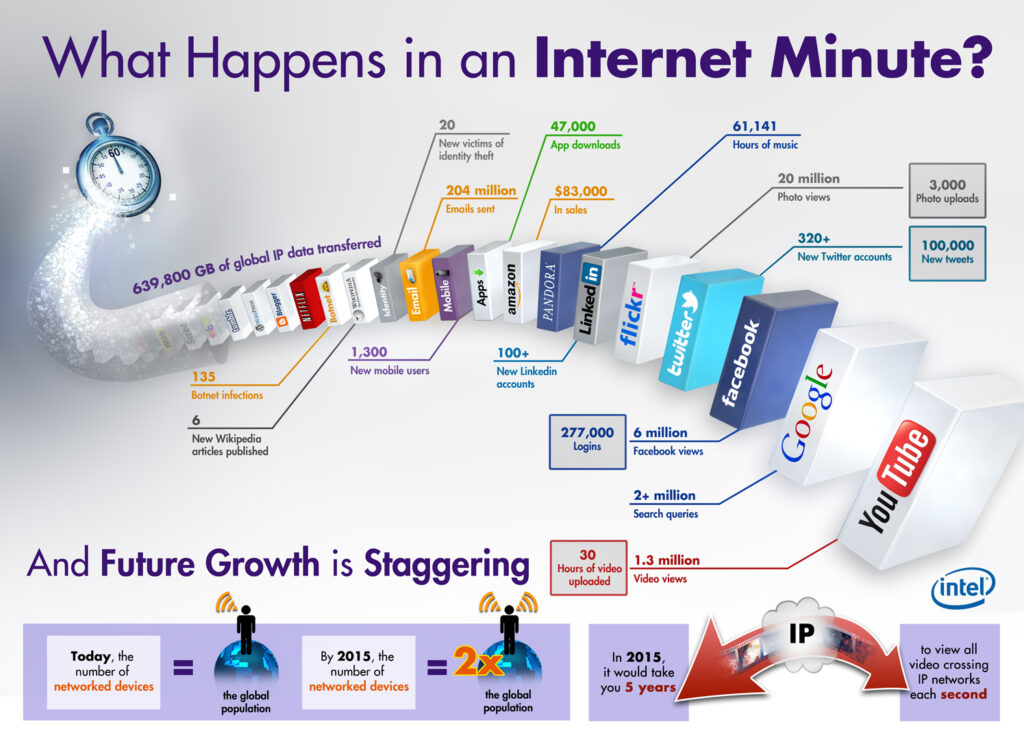A recent book entitled Big Data: A Revolution That Will Transform How We Live, Work, and Think has been getting a lot of press. The book was written by Viktor Mayer-Schönberger, a respected Internet governance theorist, and Kenneth Cukier, a long-time technology journalist who’s been with The Economist for many years. In a review of the book, Gil Press writes:
“Big Data is an excellent introduction for general audiences to what has become a topic of conversation everywhere, faster than any other technology-driven buzzword in recent memory. To those who may react to ‘big data’ as today’s incarnation of ‘big brother,’ Mayer-Schönberger and Cukier offer a comprehensive and highly readable overview of the benefits and risks associated with big data, which they define as ‘the ability of society to harness information in novel ways to produce useful insights or goods and services of significant value.’ [“What’s to be Done about Big Data?” Forbes, 11 March 2013]
Press actually spoke with the authors, who “reacted sharply,” when he “asked them if they are cheerleaders for big data, as one reviewer implied. ‘We are messengers of big data, not its evangelists,’ said Cukier. Added Mayer-Schönberger: ‘The reviewer did not read the book.'” Clearly, Cukier and Mayer-Schönberger aren’t cheerleaders because cheerleaders never point out the problems and weak spots associated with the teams they support. Cukier and Mayer-Schönberger, on the other hand, do discuss challenges associated with big data. Press insists it is “the most important part of the book.” The reason for that, he explains, is that by pointing out both the benefits and risks associated with big data the book provides “a launch-pad to a much-needed conversation regarding what’s to be done about big data.” Cory Doctorow agrees with Press that “issues of governance, regulation, and public policy” represent “some of the most interesting material in the book.” In fact, Doctorow believes that the discussion “probably needs to be expanded into its own volume.” [“Big Data: A Revolution That Will Transform How We Live, Work, and Think,” boing boing, 8 March 2013]
For companies involved with big data, the greatest challenges they will face will involve privacy. At least those will be the challenges that will create the most public reactions. “Mayer-Schönberger and Cukier point out that perfect anonymization is impossible in the age of big data,” writes Press, “they are concerned about two other, less-discussed, risks. One is what they call ‘propensity’ or using big data predictions to punish people even before they acted. … The possibility that our fascination with data may become a dangerous addiction is the third risk the authors of Big Data discuss, what they call ‘the dictatorship of data.’ The potential for abuse of data by people with bad intentions and misuse by blindly admiring people with good intentions is as big as the data itself.” Doctorow writes:
“We know that computers make mistakes, but when we combine the understandable enthusiasm for Big Data’s remarkable, counterintuitive recommendations with the mysterious and oracular nature of the algorithms that produce those conclusions, then we’re taking on a huge risk when we put these algorithms in charge of anything that matters.”
Despite all the relevant concerns associated with big data, Press writes, “Mayer-Schönberger and Cukier make it clear in the book that big data does not equal the rise of the machines. Big data, they say, is not about trying to ‘teach’ a computer to ‘think’ like [a] human. Nor does it foretell the ‘end of theory’ or abandoning making and testing hypotheses, the bedrock of scientific progress for centuries. ‘In the world of big data,’ Mayer-Schönberger and Cukier say, ‘it is our most human traits that will need to be fostered — our creativity, intuition, and intellectual ambition.'” But, as the subtitle of their book declares, big data is transforming how we live, work, and think. The following infographic from Intel aptly illustrates why big data is so big.

Neither big data nor its analysis is going away. That genie can never be put back in the bottle — nor should it be. The benefits of big data analysis are simply too great. Nevertheless, Mayer-Schönberger and Cukier are wise in pointing out potential pitfalls that lie in the road ahead. Irving Wladawsky-Berger, like Mayer-Schönberger and Cukier, believes that big data can transform the world. [“Reinventing Society in the Wake of Big Data,” Wall Street Journal, 22 March 2013] Wladawsky-Berger cites MIT Media Lab Professor Alex “Sandy” Pentland, a big data pioneer:
“‘This is the first time in human history that we have the ability to see enough about ourselves that we can hope to actually build social systems that work qualitatively better than the systems we’ve always had,’ says Pentland. ‘That’s a remarkable change. It’s like the phase transition that happened when writing was developed or when education became ubiquitous, or perhaps when people began being tied together via the Internet. … I believe that the power of Big Data is that it’s information about people’s behavior – it’s about customers, employees, and prospects for your new business, …’ he says. ‘This Big Data comes from location data from your cell phone and transaction data about the things you buy with your credit card. It’s the little data breadcrumbs that you leave behind you as you move around in the world. What those breadcrumbs tell is the story of your life. It tells what you’ve chosen to do. … Who you actually are is determined by where you spend time, and which things you buy. Big data is increasingly about real behavior, and by analyzing this sort of data, scientists can tell an enormous amount about you. They can tell whether you are the sort of person who will pay back loans. They can tell you if you’re likely to get diabetes.'”
That kind of analysis can obviously be very transformative. Like most other pundits who discuss big data, Wladawsky-Berger is concerned about privacy issues. He writes:
“For big data to realize its potential requires access to vast amounts of personal information, which leads to very serious issues about privacy, data ownership and data control. Pentland strongly advocates that individuals should have the final say about the use of the data collected about them, including the ability to put the data in circulation and turn it into a personal asset by giving permission to share it for value in return. He has been working closely with the World Economic Forum (WEF) to he
lp develop the proper guidelines for the collection and use of personal data in collaboration with private companies, government representatives, end user privacy and rights groups, academics and others.”
All of the benefits and challenges of big data come from analysis. Data that sits fallow in a database isn’t really the issue. “The value comes from what you do with it,” writes Barry Devlin, “not how big it happens to be.” [“Big Analytics Rather Than Big Data,” SmartData Collective, 7 February 2013] When most pundits write about big data, what they are really commenting on is the analysis that flows from it. For example, Maria Deutshcer writes, “There are so many ways Big Data will impact our lives, from the economy to education.” It’s clear she is talking about analysis when she explains that “organizations are leveraging analytics to generate business value and, in the case of the Rio de Janeiro municipality, to raise the living standards of over 6 million people.” [“Changing the World: Big Data Deep Dive Part 1,” SiliconANGLE, 25 February 2013]
The debate about big data is just getting started. Like any large, amorphous concept, big data will be viewed from any number of different perspectives and proponents of those perspectives will support their views using different arguments. It would be unwise to ignore those who hold different perspectives simply because you don’t believe in the arguments they make. Most arguments hold a kernel of truth and, if we are to gain the maximum benefit from the analysis of big data, we need to be aware of all of the potential risks associated with that analysis as well the benefits it can provide.




